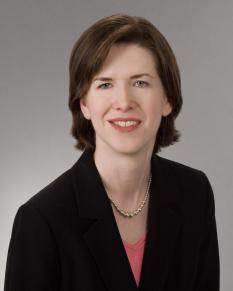Alumni Spotlight: Amy Moore
The BRET Office of Career Development presents Alumni Spotlight, an interview with a former BRET PhD student and post-doc and written by a current trainee. Hear how Vanderbilt has shaped an alumnus's career path, skill set, and network, as well as what career advice they have to give. For more information or if you are interested in writing an Alumni Spotlight, contact Kate Stuart.
Written by Bianca Sirbu, BRET Graduate Student
Amy Moore is the Director of Research Programs for the Georgia Research Alliance, the broad organization that encompasses the Georgia Cancer Coalition. Below, Dr. Moore kindly shares her career story, which contains elements of “romance, intentional planning, adaptability, and serendipity.”
Sirbu: Would you describe your scientific training before and during your time at Vanderbilt?
Dr. Moore: I received my PhD in Microbiology and Immunology from Wake Forest University School of Medicine in 2002. Specifically, I trained as a virologist. Along the way, I attended a virology conference and met a boy, whom I eventually married. He also trained as a virologist; actually, he studied the same virus.
Once he completed his degree in 2003, we went to Vanderbilt University for postdoctoral fellowships. He stayed in virology. I moved into a cancer lab with Professor Scott Hiebert. Part of this was me simply following some scientific curiosities from my PhD work. Another part was an intentional effort to create scientific diversity in our husband-wife team since our goal was to stay on the academic track.
How did the ‘two-body’ problem affect your next steps?
Dr. Moore: We both interviewed for academic positions in a time when NIH budgets were already declining. We ran into several situations where one of us had an offer in a place that wasn’t as good for the other person. Finally, my husband received an offer from Emory University, which aligned well with his interests in molecular virology and vaccine development.
What interests did you pursue when looking for positions in Atlanta?
Dr. Moore: I decided to look for opportunities that were still connected to cancer, but from a research administration angle. While still at Vanderbilt, I served as the President of the Post-doctoral Association and, through that role, was appointed to several committees within the Medical Center. That position gave me several “behind-the-scenes” looks at the work done in research administration. I enjoyed these experiences and actively cultivated additional skills that proved valuable in my future job search.
How did you learn about the Georgia Cancer Coalition (GCC) and what is the GCC?
Dr. Moore: I stumbled upon the GCC through internet searching. The non-profit organization was created in 2001 by former Governor Roy Barnes and the late Hamilton Jordan. The GCC was a statewide initiative designed to increase the cancer research infrastructure in Georgia through various mechanisms, including recruitment of outstanding cancer researchers and clinicians across our state’s academic institutions.
Did the GCC have an opened position that you applied to?
Dr. Moore: No. There was no position advertised at that time. But, I reviewed the organization’s website and quickly determined that they didn’t have anyone on staff with a formal science background. I felt this was essential, particularly to understand the research of the individuals being recruited.
How did you create an opportunity for yourself?
Dr. Moore: I figured out the President’s email address, even though it wasn’t posted on the website. I tried two variations of first and last name, following the format I had seen online for other GCC employees. One of the emails bounced back, but the other made it through. In my email, I explained how I felt I could contribute to the organization’s mission. As luck would have it, my predecessor as Director of Research Programs had just left to take a consulting job and they had a vacancy.
Would you describe your role as Director of Research Programs at the GCC?
Dr. Moore: I managed our research and grants portfolio (pre- and post-award functions), drafted requests for proposals (RFPs), managed the peer-review process, served as a liaison between the Vice Presidents for Research (VPRs) at our partner universities, and organized research symposia, among other activities.
The GCC recently merged with the Georgia Research Alliance (GRA). What is your current job within this broader organization?
Dr. Moore: As Director of Research Programs for GRA, I help manage our scientific portfolio, participate in strategic planning initiatives across our partner institutions, and help monitor metrics and performance outcomes for our Academy of Eminent Scholars, which currently includes 65 scientists spanning a broad range of scientific disciplines.
What is the biggest challenge you see in your field?
Dr. Moore: The rate of failure for budget approval is challenging. The actual grants management was not difficult for me, but I’ve learned a lot about how funding flows at the state level and how to advocate effectively to legislators.
Current PhD students may be curious to know if post-doctoral training is necessary for this type of job.
Dr. Moore: Yes, I believe it is. The post-doc experience provided me an invaluable depth and breadth of scientific background that I need to interact with researchers as well as academic administrators and legislators. Also, the post-doc gave me the chance to begin cultivating my interest and skills in research administration.
Where would you recommend PhDs look to find jobs similar to yours?
Dr. Moore: I would check grants administration jobs within organizations and academic institutions. Technology transfer and commercialization centers may also be of interest to those wanting to pursue a similar path.
Lastly, what advice would you give to current and aspiring PhDs?
Dr. Moore: I would recommend keeping an open mind and looking for different ways to use your background. It’s important to be flexible. Also, know yourself, market yourself and take charge. Be persistent, bold and prepared to say: “You need me.”

